|
|
|
Sort Order |
|
|
|
Items / Page
|
|
|
|
|
|
|
| Srl | Item |
| 1 |
ID:
163059
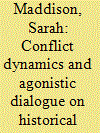

|
|
|
|
|
| Summary/Abstract |
This article contends that the type of high-level political consensus needed to reach a peace agreement is often insufficient for rebuilding and transforming wider social relations. Consensus-focused processes tend to suppress divergent views and experiences of conflict, particularly among grassroots conflict actors, and risk deepening social divides by homogenising diverse memories of past violence, with potentially dangerous consequences. In response to these concerns this article advances an understanding of agonistic dialogue and explores an example of such dialogue in communal conflict in Indonesia. Building on an understanding of effective dialogue as sustained, intensive and relational, this article also underscores the need for effective dialogue to have politico-institutional support and to be locally driven and owned by actors who are legitimate and trusted in the eyes of conflict protagonists.
|
|
|
|
|
|
|
|
|
|
|
|
|
|
|
|
| 2 |
ID:
163061
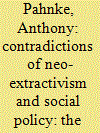

|
|
|
|
|
| Summary/Abstract |
This article explores how contradictory development tendencies within Brazil’s primary sector have contributed to the country’s enduring political crisis. I show that President Rousseff, when dealing with declining royalty payments from natural resource exports and a decrease in tax revenue from imports, financed social policies in ways that her opponents branded as unconstitutional to remove her from power. After documenting the central players within the political crisis, namely those who have been under investigation in Operação Lava Jato (Operation Car Wash), I illustrate how the ongoing corruption scandals plaguing Brazil have their roots in the country’s raw material export industries.
|
|
|
|
|
|
|
|
|
|
|
|
|
|
|
|
| 3 |
ID:
163056
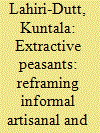

|
|
|
|
|
| Summary/Abstract |
This paper explores the ongoing reconfiguration of peasant labour processes from agriculture to informal mineral extraction, outlining the motivations of the rural poor in adopting mining and quarrying, and discusses how social sciences can best account for this significant shift towards extractive livelihoods. It argues that the ‘extractive peasants’ best explain the contemporary changes in rural, mineral-rich tracts throughout the Global South, and peasant mining practices are part of the informal economies. The extractive peasants return intellectual attention to practices that disrupt contemporary global mineral production and place the politics of the poor within broader debates on resource politics.
|
|
|
|
|
|
|
|
|
|
|
|
|
|
|
|
| 4 |
ID:
163057


|
|
|
|
|
| Summary/Abstract |
This study explores differing strategies and tactics employed by the peshmerga forces against the Islamic State (IS). This experience highlights a number of issues which are relevant to contemporary security debates. Firstly, the struggle highlights important aspects of the development of the peshmerga and their strategies as an organised non-state military force (defending as it does the Kurdistan Region in Iraq). Secondly, the peshmerga–IS conflict is an important case study of small wars. The strategy and tactics used here are therefore useful empirical references about the effectiveness of military force in counter-insurgency. Finally, the war against IS united the peshmerga forces, possibly for the first time, and effected a radical change in the Kurdish use of military tactics, including the shift from defensive to offensive strategies. The article examines the methods employed by the peshmerga forces against IS, explains why the cases of Makhmour and Shingal stand out as tipping points, and discusses the evolution of Kurdish defence capacity.
|
|
|
|
|
|
|
|
|
|
|
|
|
|
|
|
| 5 |
ID:
163052


|
|
|
|
|
| Summary/Abstract |
In issuing and circulating a litany of documents, organisations produce statements with important textual and material qualities and affects. While a discursive analysis focuses on the former, interrogating how language is used, this paper propounds the need to explore the physicality of these objects too and adopts several heuristic devices to do so. First, it outlines how the issuance of certain documents within the refugee regime suppresses within a ‘black box’ the supporting and competing narratives that resulted in their genesis. Second, and relatedly, it considers why particular announcements are capable of catalysing responses that outlive their authors’ finite intentions. Tracing the genealogy of these documents is thus argued to be critical for explaining the persistent and yet unpredictable influence of ideas, interests and pressures on institutional conduct, even long after their proponents have changed tack. By illustrating why greater attention should be paid to the ways that material objects can come to shape organisational behaviour, in this case legal texts, this article complements existing theoretical frameworks used to explain UNHCR’s conduct. This helps explain how, when and why non-legally binding declarations nonetheless came to bind UNHCR’s actions as it attempted to cancel the status of Eritrean refugees in 2002.
|
|
|
|
|
|
|
|
|
|
|
|
|
|
|
|
| 6 |
ID:
163055
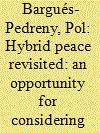

|
|
|
|
|
| Summary/Abstract |
Critical peacebuilding scholars have focused on the impact of the encounter between the ‘local’ and the ‘international’, framing the notion of ‘hybridity’ as a conceptual mirror to the reality of such encounter. This paper explores a dual aspect of hybridity to highlight a tension. Understood as a descriptor of contingent realities that emerge after the international–local encounter, hybridity requires acknowledging that peacebuilders can do little to shape the course of events. Yet, framed as a process that can enable the pursuit of empowering solutions embedded in plurality and relationality, hybridity encourages forms of interventionism that may perpetuate the binaries and exclusions usually associated to the liberal peace paradigm. The paper suggests that when hybridity is used to improve peacebuilding practice, an opportunity may be missed to open up this tension and analytically discuss options, including withdrawal which, whilst largely left out of the conceptual picture, may be relevant to calls for reclaiming the self-governance of the subjects of peacebuilding themselves.
|
|
|
|
|
|
|
|
|
|
|
|
|
|
|
|
| 7 |
ID:
163050


|
|
|
|
|
| Summary/Abstract |
This article provides a critical examination of the current extensive promotion of ‘self-reliance’ for refugees. The existing scholarship largely ignores the unsuccessful historical record of international assistance to foster refugees’ self-reliance and fails to discuss its problematic linkages to neoliberalism and the notion of ‘dependency’. The article reveals that the current conceptualisation and practice of self-reliance are largely shaped by the priorities of international donors that aim to create cost-effective exit strategies from long-term refugee populations. The authors argue that where uncritically interpreted and applied, the promotion of self-reliance can result in unintended and undesirable consequences for refugees’ well-being and protection.
|
|
|
|
|
|
|
|
|
|
|
|
|
|
|
|
| 8 |
ID:
163058
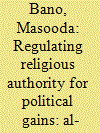

|
|
|
|
|
| Summary/Abstract |
The shedding of blood is a serious matter in Islamic law; disregard for human life negates the very essence of just rule. By standing by General al-Sisi as he suppressed the Muslim Brotherhood, the popular legitimacy of al-Azhar – the oldest seat of Islamic learning – was called into question. This article shows how the al-Sisi government skilfully deployed the two other state-controlled religious establishments, the Ministry of Awqaf (Religious Endowments) and Dar-ul-Ifta, to boost al-Azhar’s popular legitimacy in this context. Existing scholarship highlights the importance of competition within the Egyptian religious sphere to explain how the Egyptian state co-opts the al-Azhari official establishment. This article instead shows how the state, equally skilfully, uses state institutions to boost al-Azhar’s popular legitimacy – albeit to ensure that it remains useful for the purposes of political legitimisation. Political authority and religious authority in Egypt thus remain closely entangled.
|
|
|
|
|
|
|
|
|
|
|
|
|
|
|
|
| 9 |
ID:
163060


|
|
|
|
|
| Summary/Abstract |
This article examines the patterns of government intervention in social housing in Brazil to analyse the role of the private sector in the elaboration and implementation of social housing policies during the Workers’ Party government. It draws on case study research, and I examine areas which impact on the way social housing has been implemented since 2003 to study the concentration of decision power the private construction sector has on social housing policymaking, which sets the tone of government intervention on social housing. I argue this was part of the Workers’ Party’s approach to neoliberal policies in a more moderated style, a type of intervention repeated on numerous occasions under previous administrations. This article concludes by noting the prominent role of the private sector in social housing developments.
|
|
|
|
|
|
|
|
|
|
|
|
|
|
|
|
| 10 |
ID:
163053
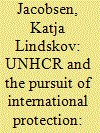

|
|
|
|
|
| Summary/Abstract |
Better management and new technological solutions are increasingly portrayed as the way to improve refugee protection and enhance the accountability of humanitarian actors. Taking concepts of legibility, quantification and co-production as the point of departure, this article explores how techno-bureaucratic practices shape conceptions of international refugee protection. We do this by examining the evolving roles of results-based management (RBM), biometrics and cash-based interventions as ‘accountability technologies’ in the United Nations High Commissioner for Refugees’ international protection efforts. The article challenges the assumption that these technologies produce a seamless form of accountability that is equally attentive to donor requests and the protection needs of refugees. By focusing on how the constitution of these techniques as ‘accountability solutions’ shapes conceptions of the very meaning of protection (ie the problem to be addressed), we also show what dimensions of protection get omitted in this co-production of technical solutions and socio-political problems.
|
|
|
|
|
|
|
|
|
|
|
|
|
|
|
|
| 11 |
ID:
163051


|
|
|
|
|
| Summary/Abstract |
Critiques of the voluntourism industry focus on power imbalances, colonial legacies and white privilege. Drawing on the literatures of development and voluntourism to find points of comparison, we argue that the voluntourism industry reflects myriad development problems, such as structural challenges, the fungibility of aid, corruption, representation, worker narratives and temporality. We assert that many of the problems inherent in voluntourism could be remedied by the evolution of a contract norm between volunteers and their local partners, where reciprocity and transparency might practically serve as a corrective to voluntourism’s most entrenched problems.
|
|
|
|
|
|
|
|
|
|
|
|
|
|
|
|
| 12 |
ID:
163054
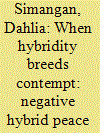

|
|
|
|
|
| Summary/Abstract |
This paper examines the unresolved tensions from international/liberal-local encounters during Cambodia’s post-conflict peacebuilding in the areas of governance and justice. The quick introduction but weak implementation of international/liberal norms and institutions enabled the local elite to contextualise, negotiate, resist and reject those international/liberal norms and institutions to preserve an elite-centred status quo. The outcome of these international/liberal-local encounters is a negative hybrid peace in which peace is neither liberal nor emancipatory. The analysis in this paper contributes to the discussion on hybridity in peacebuilding by describing the characteristics, explaining the formation process and tracing the long-term consequences of negative hybrid peace
|
|
|
|
|
|
|
|
|
|
|
|
|
|
|
|
| 13 |
ID:
163049


|
|
|
|
|
| Summary/Abstract |
The study examines the determinants of rapes in India using state-level data for the time period 2001–2015. The panel model analysis indicates that there is no impact of education and economic growth, pointing towards a larger role of social and cultural factors in this context. The effect of deterrence variables (such as the number of police stations) is non-existent, possibly pointing towards the incompetency of the police force. Social attitude towards women emerged as the most robust predictor of the extent of rapes in India. We argue that the fundamental problem lies in the misogyny deeply rooted in the Indian society.
|
|
|
|
|
|
|
|
|
|
|
|
|
|
|
|
|
|
|
|
|